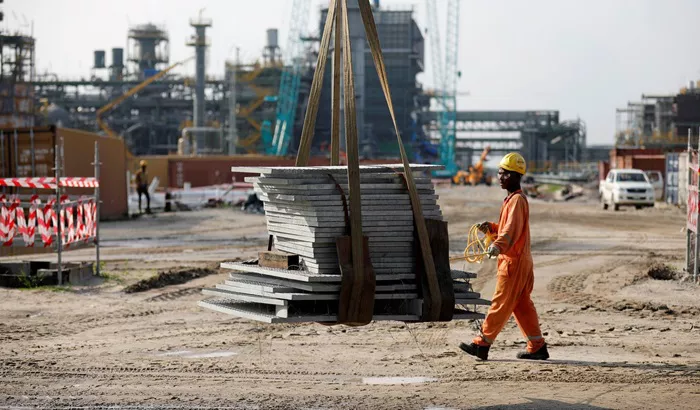Aliko Dangote, President of the Dangote Group, has revealed that his $20 billion, 650,000-barrel-per-day refinery is increasingly relying on crude oil imports from the United States to maintain operations, as domestic crude shortages persist despite the Federal Government’s naira-for-crude exchange policy.
Speaking during a visit by the Technical Committee of the One-Stop Shop (OSS) for the naira-for-crude initiative, Dangote confirmed that the refinery, though designed to handle a wide range of crude types, has had to turn to the U.S. to bridge a growing supply gap. “Due to a shortage of domestic crude oil, the refinery has increasingly relied on imports from the United States to meet its needs in recent months,” a statement from the Dangote Group said on Thursday.
Crude Imports on the Rise
New data shows the Dangote Petroleum Refinery is set to import 17.65 million barrels of crude oil between April and July 2025. Of this, approximately 3.65 million barrels have already been delivered in April and May, while another nine million barrels are scheduled for delivery in June, followed by five million in July. The bulk of these imports are of the WTI Midland grade, a light sweet crude from the U.S.
Shipping reports confirm this upward trend. Between April 6 and May 28, 2025, 21 oil tankers delivered over 3.65 million barrels of crude to the refinery via the Lekki Deep Seaport. Imports began with a 130,000-barrel shipment on April 1 and continued throughout May with multiple deliveries. On May 23 alone, two vessels discharged a combined 398,454 metric tons of crude.
Analysts note that the U.S. crude now accounts for a third of all purchases by the refinery so far this year. Vessel-tracking data compiled by Bloomberg supports these figures, highlighting the growing reliance on foreign supply due to limited and inconsistent availability of Nigerian crude grades like Bonny Light and Qua Iboe.
Naira-for-Crude Initiative Under Scrutiny
The Dangote refinery’s dependence on imported feedstock raises questions about the effectiveness of the Federal Government’s naira-for-crude exchange deal, a program designed to support domestic refiners and conserve foreign exchange.
Initially launched with a six-month agreement that ended in March 2025, the deal was recently revived following a directive from the Federal Executive Council. It is intended as a long-term policy measure to ensure sustainable local refining. The initiative involves exchanging Nigerian crude for naira payments, thus reducing reliance on foreign exchange reserves.
Dangote lauded the naira-for-crude swap for helping stabilize fuel prices and easing pressure on the dollar. “The initiative has significantly lowered petroleum product prices, reduced FX demand, and strengthened the local currency,” he said.
However, the refinery’s need to import U.S. crude has highlighted gaps in the policy’s implementation. Between December 2024 and June 2025, Dangote refinery has imported 27.1 million barrels from the U.S., compared to 46.2 million barrels supplied by domestic producers.
Why U.S. Crude?
Industry experts say the refinery’s preference for WTI Midland stems from its quality and consistency. U.S. light sweet crude is easier and more cost-effective to refine into high-value fuels such as gasoline, diesel, and aviation jet fuel. Moreover, the U.S. supply chain is seen as more reliable and competitively priced.
“Feedstock predictability is critical. A facility of this scale cannot afford supply disruptions, even if the crude is sourced from right next door,” said a senior analyst at Rystad Energy.
Randy Hurburun, senior refinery analyst at Energy Aspects Ltd., added, “WTI offers Dangote advantages over Nigerian crudes that result in improved yields of reformate and better gasoline blending capabilities.”
Global oil markets expert Aleksandr Butov noted that Nigeria’s ongoing production challenges — including underinvestment, pipeline vandalism, and infrastructure issues — continue to undermine supply reliability.
Industrial Impact and National Development
During the OSS committee’s visit, coordinator Maureen Ogbonna praised the refinery’s transformative impact on Nigeria’s industrial landscape. “There’s scarcely any sector unaffected — from pharmaceuticals to construction and agriculture,” she said. “This is a symbol of economic emancipation.”
Ogbonna described the facility’s state-of-the-art petrochemical laboratory as “an institution in itself,” unmatched in Nigeria or globally. She emphasized the committee’s commitment to removing regulatory and logistical bottlenecks that hinder local supply and refining.
She also urged Dangote to stay focused despite criticism. “This is not a personal enterprise; it’s a global achievement. He was never self-centred — it’s about Nigeria’s future,” she said.
Refinery Capacity and Vision
The Dangote refinery, located in Lagos, is engineered to process a wide range of crude types, including African, Middle Eastern, and American grades. It is capable of meeting 100 percent of Nigeria’s domestic demand for petrol, diesel, kerosene, and aviation fuel, with surplus capacity for export.
Company officials remain optimistic about reaching full operational capacity of 650,000 barrels per day, with projections targeting mid-2025. The current phase of intensified crude imports, they say, is essential to achieving that goal.
In a recent statement, Dangote Industries reaffirmed its commitment to stable fuel prices. Group Chief Branding and Communications Officer Anthony Chiejina said the decision to avoid passing global price shocks onto consumers was part of the firm’s pledge to support the Nigerian economy.
“We are immensely grateful to President Bola Tinubu for making this possible through the commendable naira-for-crude initiative, which has enabled us to consistently reduce the price of petroleum products for the benefit of all Nigerians,” the statement read.
As Nigeria continues its journey toward full energy self-sufficiency, the success — and sustainability — of the Dangote refinery will remain a critical barometer for the nation’s refining ambitions and economic resilience.


